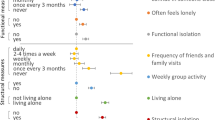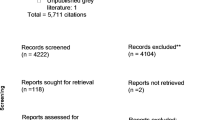Abstract
The share of children living with grandparents has increased in recent years. Previous studies have examined how time with grandparents is associated with child well-being, but we know little about how grandparents fare in their time with grandchildren. We used diary data from the American Time Use Study (ATUS) to examine the association between grandparents’ time in activities with grandchildren and multiple measures of their subjective well-being in those activities. We used a subsample of co-residential grandparents from the American Time Use Study (N = 868 individuals; 2474 activities), paying close attention to potential differences between three-generational families (those with parents, grandparents and grandchildren living together) and grandfamilies (which do not include the parent generation). We examined subjective well-being (happiness, meaning, sadness, tiredness and stress) in relation to family type (three-generational or grandfamily) and grandchild presence during the activity, as well as other characteristics of the activity (e.g., type of activity, duration, etc.) and of the grandparent (i.e., demographic variables). This is the first study to address grandparent SWB as affective response to activities in relation to presence of grandchildren during those activities. Results of multilevel models show that grandparents living with their grandchildren experienced more happiness and more meaningfulness when they engaged in activities with their grandchildren compared to spending time alone or with other people. This relationship was partially moderated by family type, such that grandfamily grandparents experienced less happiness in time with grandchildren than alone, relative to grandparents in three-generational families.
Similar content being viewed by others
References
American time use survey user’s guide: Understanding ATUS 2003 to 2017. (2018). https://www.bls.gov/atus/documents.htm.
Amorim, M., Dunifon, R. E., & Pilkauskas, N. V. (2017). The magnitude and timing of grandparental coresidence during childhood in the US. Demographic Research,37, 1695–1706. https://doi.org/10.4054/DemRes.2017.37.52.
Arpino, B., Bordone, V., & Balbo, N. (2018). Grandparenting, education and subjective well-being of older Europeans. European Journal of Ageing,15(3), 251–263. https://doi.org/10.1007/s10433-018-0467-2.
Bailey, S. J., Haynes, D. C., & Letiecq, B. L. (2013). “How can you retire when you still got a kid in school?” Economics of raising grandchildren in rural areas. Marriage & Family Review,49(8), 671–693. https://doi.org/10.1080/01494929.2013.803009.
Bordone, V., & Arpino, B. (2016). Do grandchildren influence how old you feel? Journal of Aging and Health,28(6), 1055–1072. https://doi.org/10.1177/0898264315618920.
Bowers, B. F., & Myers, B. J. (1999). Grandmothers providing care for grandchildren: Consequences of various levels of caregiving. Family Relations,48, 303–311.
Diener, E., & Biswas-Diener, R. (2008). Happiness: Unlocking the mysteries of psychological wealth. Malden, MA: Blackwell.
Diener, E., Pressman, S. D., Hunter, J., & Delgadillo-Chase, D. (2017). If, why, and when subjective well-being influences health, and future needed research. Applied Psychology: Health and Well-Being,9(2), 133–167. https://doi.org/10.1111/aphw.12090.
Diener, E., & Tay, L. (2014). Review of the day reconstruction method (DRM). Social Indicators Research,116(1), 255–267. https://doi.org/10.1007/s11205-013-0279-x.
Dolbin-Macnab, M. L., Rodgers, B. E., & Traylor, R. M. (2009). Bridging the generations: A retrospective examination of adults’ relationships with their kinship caregivers. Journal of Intergenerational Relationships,7(2–3), 159–176. https://doi.org/10.1080/15350770902851197.
Dunifon, R. E. (2018). “You’ve always been there for me”: Understanding the lives of children raised by grandparents. Camden, NJ: Rutgers University.
Dunifon, R. E., Kopko, K., Wakschlag, L., & Chase-Lansdale, P. L. (2016). Multigenerational relationships in families with custodial grandparents. In M. H. Meyer & Y. Adbul-Malak (Eds.), Grandparenting in the United States. New York, NY: Baywood Publishing.
Dunifon, R. E., Near, C. E., & Ziol-Guest, K. M. (2018). Backup parents, playmates, friends: Grandparents’ time with grandchildren. Journal of Marriage and Family,80, 752–767. https://doi.org/10.1111/jomf.12472.
Dunifon, R. E., Ziol-Guest, K. M., & Kopko, K. (2014). Grandparent coresidence and family well-being implications for research and policy. The ANNALS of the American Academy of Political and Social Science,654(1), 110–126. https://doi.org/10.1177/0002716214526530.
Fuller-Thomson, E., & Minkler, M. (2007). Mexican American grandparents raising grandchildren: Findings from the Census 2000 American Community Survey. Families in Society: The Journal of Contemporary Social Services,88(4), 567–574.
Goodman, C. (2012). Caregiving grandmothers and their grandchildren: Well-being 9 years later. Children and Youth Services Review,34(4), 648–654. https://doi.org/10.1016/j.childyouth.2011.12.009.
Goodman, C., & Silverstein, M. (2002). Grandmothers raising grandchildren: Family structure and well-being in culturally diverse families. The Gerontologist,42(5), 676–689.
Hank, K., Cavrini, G., Di Gessa, G., & Tomassini, C. (2018). What do we know about grandparents? Insights from current quantitative data and identification of future data needs. European Journal of Ageing, 15, 225–235. https://doi.org/10.1007/s10433-018-0468-1.
Hayslip, B., Fruhauf, C. A., & Dolbin-MacNab, M. L. (2017). Grandparents raising grandchildren: What have we learned over the past decade? The Gerontologist. https://doi.org/10.1093/geront/gnx106.
Hofferth, S. L., Flood, S. M., & Sobek, M. (2013). American time use survey data extract system: Version 2.4 [Machine-readable database]. College Park, MD and Minneapolis, MN: Maryland Population Research Center and Minnesota Population Center.
Hudson, N. W., Lucas, R. E., & Donnellan, M. B. (2016). Getting older, feeling less? A cross-sectional and longitudinal investigation of developmental patterns in experiential well-being. Psychology and Aging,31(8), 847. https://doi.org/10.1037/pag0000138.
Kahneman, D., & Krueger, A. B. (2006). Developments in the measurement of subjective well-being. Journal of Economic Perspectives,20(1), 3–24.
Kahneman, D., Krueger, A. B., Schkade, D. A., Schwarz, N., & Stone, A. A. (2004). A survey method for characterizing daily life experience: The day reconstruction method. Science,306(5702), 1776–1780. https://doi.org/10.1126/science.1103572.
Kim, H.-J., Kang, H., & Johnson-Motoyama, M. (2017). The psychological well-being of grandparents who provide supplementary grandchild care: A systematic review. Journal of Family Studies,23(1), 118–141. https://doi.org/10.1080/13229400.2016.1194306.
Krueger, A. B., Kahneman, D., Fischler, C., Schkade, D., Schwarz, N., & Stone, A. A. (2009). Time use and subjective well-being in France and the US. Social Indicators Research,93(1), 7–18. https://doi.org/10.1007/s11205-008-9415-4.
Ku, L.-J. E., Stearns, S. C., Van Houtven, C. H., Lee, S.-Y. D., Dilworth-Anderson, P., & Konrad, T. R. (2013). Impact of caring for grandchildren on the health of grandparents in Taiwan. Journals of Gerontology. Series B, Psychological Sciences and Social Sciences,68(6), 1009–1021. https://doi.org/10.1093/geronb/gbt090.
Lucas, R. E., & Dyrenforth, P. S. (2006). Does the existence of social relationships matter for subjective well-being? In K. D. Vohs & E. J. Finkel (Eds.), Self and relationships: Connecting intrapersonal and interpersonal processes (pp. 254–273). New York, NY: Guilford Press.
Mahne, K., & Huxhold, O. (2014). Grandparenthood and subjective well-being: Moderating effects of educational level. Journals of Gerontology. Series B, Psychological Sciences and Social Sciences,70(5), 782–792. https://doi.org/10.1093/geronb/gbu147.
Manns, A., Atler, K. E., & Fruhauf, C. A. (2017). Daily activities and experiences of custodial grandparents: An exploratory study. Physical & Occupational Therapy In Geriatrics,35(1), 34–48. https://doi.org/10.1080/02703181.2017.1280112.
Moore, S. M., & Rosenthal, D. A. (2015). Personal growth, grandmother engagement and satisfaction among non-custodial grandmothers. Aging & Mental Health,19(2), 136–143. https://doi.org/10.1080/13607863.2014.920302.
Musick, K., Meier, A., & Flood, S. (2016). How parents fare: Mothers’ and fathers’ subjective well-being in time with children. American Sociological Review,81(5), 1069–1095. https://doi.org/10.1177/003122416663917.
Ngamaba, K. H., Panagioti, M., & Armitage, C. J. (2017). How strongly related are health status and subjective well-being? Systematic review and meta-analysis. The European Journal of Public Health,27(5), 879–885. https://doi.org/10.1093/eurpub/ckx081.
Pilkauskas, N. V., & Dunifon, R. E. (2016). Understanding grandfamilies: Characteristics of grandparents, nonresident parents, and children. Journal of Marriage and Family, 78, 623–633. https://doi.org/10.1111/jomf.12291.
Raudenbush, S. W., & Bryk, A. S. (2002). Hierarchical linear models: Applications and data analysis methods (Vol. 1). Thousand Oaks, CA: Sage.
Sheppard, P., & Monden, C. (2019). Becoming a first-time grandparent and subjective well-being: A fixed effects approach. Journal of Marriage and Family,81(4), 1016–1026. https://doi.org/10.1111/jomf.12584.
Siedlecki, K. L., Salthouse, T. A., Oishi, S., & Jeswani, S. (2014). The relationship between social support and subjective well-being across age. Social Indicators Research,117(2), 561–576. https://doi.org/10.1007/s11205-013-0361-4.
Triadó, C., Villar, F., Celdrán, M., & Solé, C. (2014). Grandparents who provide auxiliary care for their grandchildren: Satisfaction, difficulties, and impact on their health and well-being. Journal of Intergenerational Relationships,12(2), 113–127. https://doi.org/10.1080/15350770.2014.901102.
Author information
Authors and Affiliations
Corresponding author
Additional information
Publisher's Note
Springer Nature remains neutral with regard to jurisdictional claims in published maps and institutional affiliations.
Rights and permissions
About this article
Cite this article
Dunifon, R.E., Musick, K.A. & Near, C.E. Time with Grandchildren: Subjective Well-Being Among Grandparents Living with Their Grandchildren. Soc Indic Res 148, 681–702 (2020). https://doi.org/10.1007/s11205-019-02206-9
Accepted:
Published:
Issue Date:
DOI: https://doi.org/10.1007/s11205-019-02206-9




